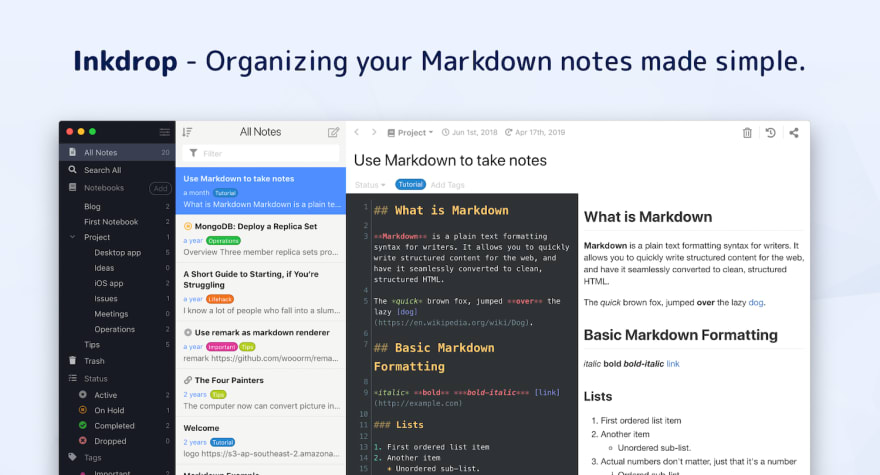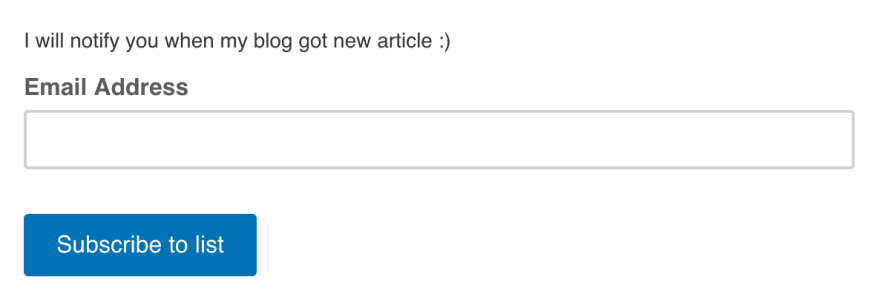This post was originally published here
It’s been 6 years since I started my freelancing career as a full-stack developer in Tokyo. In recent years I work for companies only 30% of a year and 70% is assigned for my personal projects like Inkdrop while I still make the same income. I love my life style. What made it possible is project-based pricing, not hourly pricing.
I usually work with start-up companies. First I get started from having a meeting with them and suggest what I can help in their project. My scope of the work would be wide and various at each project such as designing UI, building front-end, back-end, mobile apps, operating databases, data analytics, etc. Once my scope has been decided I make a quotation for the work and propose it to the client.
It’s easy for freelance developers to price themselves with an hourly rate, and most of them start out with it. You don’t need to have negotiations with this pricing. But if you are a well-experienced developer, rethink about your pricing strategies because you are losing your income. We are not like a crew working at a conveyor belt, so you should be tied the price of the project to the client’s end result, not to the time you worked. With the project-based fees, I get more time for my personal projects instead of getting less fees when I finished the work fast with efficient ways while the client was happy because the end result is all that the client cares about.
But how to determine how much to charge? There is no formula, no rules, and no perfect way to do it. But there’re a handful of criteria to make up your pricing for every client that I will explain in a moment.
Trust yourself
After understanding the client’s request, you will consider what your tasks will look like and evaluate them with 4 criteria: Efficiency, urgency, specialty and effectiveness. But it’s important to have your desired price before you think about these criteria, that is, how much you expect this client to pay.
The desired price is affected by your confidence a lot. Your lack of confidence came across as lowering price because you want to avoid having responsibility to your work. You need sufficient self-confidence by having many successful experiences as possible so that you can propose the right price you would think, or you will never be able to satisfy with your proposal. Just trust yourself.
Know your market price roughly
Well, you have a desired price as a subjective perspective, and it’s better to know the market price as an objective perspective. But don’t refer to your salary when you were working at a company because your salary doesn’t include any costs for the office space, welfare benefits, budgets for buying laptops. Freelancers have to pay for them by themselves, so you should include them in your quotation.
Referring to your friends who also work as a freelance is good way to know the market price. For example, an expert Ruby on Rails engineer is getting paid 7,260 USD per month. But only I can refer to him because I know him who lives in Tokyo, could work fast and could be good at management. The price would be higher in San Francisco.
So it’s enough to know it roughly just for getting reasons for your price.
Determining how much to charge
Once you have both subjective and objective perspectives of the price, let’s evaluate your work based on 4 criteria to make up your pricing.
Criteria #1 — Efficiency
It doesn’t make sense you charge for the time that you worked if you could finish the work 3 times faster than others. For full-stack developers, their advantage is that they need less communication costs because they, for example, can design UIs with code directly and they don’t need mock-ups. This reduced costs should be considered as value.
Criteria #2 — Urgency
If you were requested to finish your work very quickly, you can charge for it. I have ever had a work to build an Android app that must be done in a week in the past. It’s risky to accept such urgent request because you might be not able to finish it. So you shouldn’t get it unless you have very high confidence to finish it.
Criteria #3 — Specialty
There are a lot of people who can build WordPress websites so these kind of work are low specialty. On the other hand, building image recognition system or recommendation system would require very specialized skill. That is, you can raise pricing for skills like them. It doesn’t matter how easy it is for you, but it matters how many people can do the same thing. You should know the time you spent to learn specialized skills would be valuable.
Criteria #4 — Effectiveness
This type of job is interesting because developers would make completely different results from the same requirements. The quality of output varies depending on who made it. So the minimum quality of the result would be that it just ‘works’. From that line, your work would have large additional value if it can satisfy users, it can get media coverage, or something like that. But you need achievements to prove that so they can trust your work will be great. For example, I am good at making apps easy to use. The evidence is that I made an iOS app that over 130k people used and a product that users would pay for it. An achievement is worth a thousand words.
Don’t sell yourself cheap
As you can see, these four criteria offer no formula or perfect way to calculate pricing. Instead, they are intangible metrics to base your pricing on.
You can even add a reason for the client to entrust you by making pricing cheap a little instead of charging it 3 times higher while you can finish the work 3 times better/faster. But don’t sell yourself too cheap or try to fit the client’s budget. That will result in both of you unhappy because low fees make you less motivated and it generates less quality. No one can be happy with poor works. If the client seems not to have enough budget, you can suggest them to drop some requirements to make it just right. So you first make a quotation, explain reasons and see their reactions.
When figuring out pricing look at these metrics and consider them, but remember that it’s important that you and the client can understand and accept the pricing to get the best result.
Criteria tell you the proper way to go
You want to earn more income in less time. Great. These criteria tell you where you should go. You should become more efficient and flexible, get specialized, and accumulate more achievements. It’s also good to focus on specific criteria.
There is another way to get more income. That is to get clients from California if you are from other country like me :) Good luck!






Top comments (10)
That's a great article, ありがとう
I have a simple tip for the under confident around there who do not know what are the market rates and feel uncomfortable asking for lots of money.
Find a potential client - or job
And simply ask three to five good friends working in IT
It works great to bootstrap your confidence and your knowledge of market prices!
Thanks for this....
"you have a desired price as a subjective perspective, and it’s better to know the market price as an objective perspective"
This is a very nice mindset to have. Some good tips in there, thank you. 🙂
Regards.
Hey Takuya, firstly I thought it was fantastic the points of your article, I too am a freelancer and is often common have questions about price and how to send the best proposal based on our experience.
Thanks for share this.
Have you considered taking equity into startups that you help build?
No
can you elaborate?
Because I just wanted to return working on my project quickly instead of helping startups in a long term.
Where do you market yourself as a freelancer? Do you use Upwork, for example?
Some comments may only be visible to logged-in visitors. Sign in to view all comments.